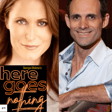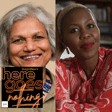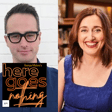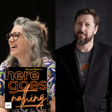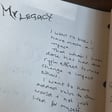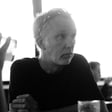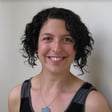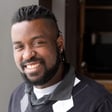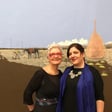Subjective Experience of Books and Reader's Disappointment
00:00:06
Speaker
Books, they are so subjective. How you engage with books is just for you. In your mind, you create images that no one can replicate. And there's nothing more deflating than you suggesting your favourite book to a friend, just gushing over the detail and the characters and the story, only being told that you'd be mad to like it.
00:00:25
Speaker
And what is wrong with you anyway? Welcome to Here Goes Nothing.
Introduction of Guest Jane Cleave and Book Consumption
00:00:29
Speaker
I'm your host, Georgia Malone. People consume books and especially niche genres for so many different reasons, whether it's escapism, building their identity, or trying to understand the world, or just for pure entertainment.
00:00:41
Speaker
This week's guest once told me that feminist sci-fi is a gateway drug into hardcore sci-fi, and I've never seen her face light up more than when she talks about aliens and space epics.
00:00:53
Speaker
Jane Cleave is a librarian and a good friend, and she just loves sci-fi. It's been a passion of hers for years and has evolved over time. And it's a genre that I really struggled to get into.
00:01:04
Speaker
So we talk about it. Join Jane and I over the next hour, as we discuss the importance of libraries, exploring what she loves and how without her, our eclectic book club will be a lot less interesting.
00:01:18
Speaker
It's Tuesday night. We're just home from work. There's a cheese platter on the table.
Jane's Earliest Artistic Memories and Family Influence
00:01:23
Speaker
It's time for Book Club. In this week's episode, we are focusing our attention to books, more specifically a genre of books that rarely get into, but my guest is a fiend for.
00:01:34
Speaker
Welcome, Jane Cleave, to Here Goes Nothing. Thanks for having me, Georgia. First up, Jane, before we get into it, what is your earliest memory of engaging with the arts? Well, i was thinking about this during the week because I did have a preview of your other episodes, so I knew this question was coming.
00:01:52
Speaker
um And I don't want to give a disservice to my parents, but I don't think we were taken to a lot of live performances, um but we were taken pretty much weekly to the library.
00:02:04
Speaker
So books and reading have always been an enormous part of of like the of our home and ah kind of the the way we've shared ideas has often been via books.
00:02:17
Speaker
My mother is an avid reader,
Journey from Picture Books to Advanced Reading
00:02:19
Speaker
still is. um My dad is a bit of a reader, but he was really into kind of pop music. So he always had the radio on. It was always kind of the popular bands of the day, a lot of 70s, 80s music.
00:02:30
Speaker
Yeah. um I know he won a couple of radio competitions and won twice, 100 albums. Oh, my God. So vinyl albums. And so our house was always ringing with sounds of Creedence, Clearwater Revival and you know, the Beatles and all that kind of great music from that era. So it was a loud home with a lot of music and a lot of reading. Yeah. um And we watched a lot of movies and, you know, Dad sat us down and showed us Ghostbusters and ah and all those kind of great movies from that era. So possibly not highbrow but certainly shaped the senses of humour and the –
00:03:09
Speaker
the way that kind of viewed the world. view the world Yeah. Yeah. And do you think that voracious reading as young is why you're such a fast reader?
Judging Premier's Book of Awards and Reading Challenges
00:03:17
Speaker
Because that's the thing I've noticed. the um I'm a slow reader, but you seem to consume books much quicker.
00:03:23
Speaker
Yeah. Look, I think it took actually took me a little while to get into proper reading. I remember getting out from the library picture books for a probably too long and then ah finding my way into into reading through couple of books, couple of types of books and, um you know, Enid Blyton was definitely one of them.
00:03:42
Speaker
um And this is i'll probably going back to, you know, when i'm seven or eight years old, Enid Blyton and Babysitter's Club and all those books and and i guess establishing those habits at a young age of reading while you're having breakfast or reading while before bed and those habits have kind of always stayed.
00:04:01
Speaker
Yeah. um I remember when I was young um and had to You had the MS Readathon. Did you have that? yeah It rings a bell, but I can't remember It was like the late 80s, early 90s, and was like, yeah, you read how many books you read is how much money went to MS.
00:04:17
Speaker
Yes. MS Society. And i used to read, like, you know, 10, and I was just consuming picture books. Yes. Yes. Yeah, yeah I'm going to win. smashing this. But, of course, my brother always won. Yes.
00:04:28
Speaker
I do... i do i have had periods in my life where I haven't been reading voraciously and have missed it and have made conscious efforts in those periods to bring it back.
00:04:40
Speaker
um And it's a habit. Yeah. Like many, many things, it's a habit. um And I think being um not brave enough but just confident in in in what you pick up and not knowing it's not for you, putting it down again if it's not for you. And I think, you know, realising that your time and your brain is kind of a limited bandwidth.
00:05:02
Speaker
And your that reading um ability of yours, I think, has enabled you to, because you were one of the judges previously at the Premier's Book of Awards in, I won't say what year.
Career Path: Arts Marketing to Librarianship
00:05:14
Speaker
Just in case. Just in case. And where you have to read significant amount of books in a short period of time and because you're assessing them. um Yeah, did you find that hard or...?
00:05:25
Speaker
you know what it was it was hard in terms of finding the time to do it and doing it in a way that where you are 100 focused because you know a lot of reading when you're doing it for pleasure maybe you're not 100 you know they're on the page with it but you need to give each of these books the time and respect to judge them fairly and approach them with i think the respect that they they all deserve as it as a piece of creation um as a created piece of work um What I found challenging, I think, was it took me out of my comfort zone yeah because, you know, you do fall into these habits of reading the same genre over and over again.
00:06:01
Speaker
And this this was not like that. There was poetry and there's historical fiction and I i have read a lot of historical fiction, um but I haven't read a lot of poetry. And it's, you know, some of it was amazing, some of it was incredible. So that was a really good thing for me because I do tend to get into a bit of a rut.
00:06:19
Speaker
Yeah. yeah one of the books actually that um we i was able to read was and an australian gothic was the kind of genre it was and it was an absolute eye-opening ride it was really amazing and i i love that opportunity yeah fantastic and so all of this reading has led to you to your current career a librarian um what got you into wanting to be able become a librarian but they being surrounded by books at all times yes well our yeah it's a bit of a misnomer that librarians sit around and read books all day. um
00:06:54
Speaker
Well, i mean, I worked with you many years ago kind of in an arts marketing type role um and I think it never it didn't feel quite like a good fit for me.
00:07:08
Speaker
um even though like going back to I guess not having that exposure to a lot performance art and that kind of art in youth, I in my youth ah kind of I felt quite intimidated in that environment.
00:07:21
Speaker
um But also even when I kind of had become exposed to to new things and developed a bit of an interest in classical music and theatre and all that kind of stuff, it still didn't feel like a really authentic fit because I'm surrounded by people who really were committing their lives to this type thing. A lot of type A personalities. A lot of type A personalities.
00:07:40
Speaker
um And so it wasn't quite a right fit for me even though I had an amazing time then. And I was lucky enough to move into a job in publishing, so a marketing and publishing company. And that felt like a really, at the time, it felt like an amazing opportunity um because, again, I always had that passion for books.
00:08:02
Speaker
But that was a really disheartening experience as well because it was London, um Penguin Books in London, and It wasn't a great era. It was the 2000s in publishing was not a great era. A lot of people losing their jobs, a lot of um worry about what's happening with technology and and people not having, um you know, authors are getting paid and all those kinds of things.
Libraries as Community Hubs and Third Spaces
00:08:23
Speaker
And seeing that kind of but how that commercialisation of publishing and writing affected the, guess, what was chosen and what was picked up was was really interesting.
00:08:34
Speaker
quite depressing. um And even though we with the area I was working in was more kind of nonfiction um and we produced some really fantastic books, it was close enough to that, ah the real beating heart of kind of fiction publishing and I didn't find it all that inspiring. So it was a kind of a bit of a downer. um So after that I realised I wanted to move into something different and libraries was a bit of a kind of roll of the dice but it's actually been a really great fit for me and I think that
00:09:05
Speaker
the community side of libraries as well as the the human human side and the the stories that people need to tell and share with each other and the connection. um And I think as well, I went into public libraries initially and they have, they're a great first step for people who are not sure about how to move into the art space. yeah um There's no barriers, everyone's welcome, it's no cost involved. So I think it's a really,
00:09:31
Speaker
A lot of kind of cultural expression happens in on that public library space um and it's a really safe space for people to kind of learn how to express themselves. And it's such a vital part of the community and especially when we're in a time where there's a lot of conversation around third spaces. Absolutely. And, you know, not your work or your home but where what is the third space you spend time in?
00:09:52
Speaker
And with the degradation but, like, people less people going to church and less people engaging those community groups. those we're losing those third spaces. i think in Europe there's a lot of, they're much better at it. There's those public outdoor spaces, but here we just don't seem to have them. And libraries is a really important one and a place for a refuge as well for people that
Focus on Sci-Fi and Feminist Sci-Fi in Book Club
00:10:12
Speaker
need it. Definitely. And it's really important place.
00:10:14
Speaker
Absolutely. And you do have a lot of, um it's very challenging work in public libraries. You get a lot of people who are in desperate times and kind of have come to the library because they don't really have anywhere else to go. So,
00:10:27
Speaker
say there is It can be quite challenging work for the people who are there trying to help people who are feeling quite desperate. um But I think the great thing about public libraries is that they're so representative of the community that they've sprung up in. yeah So they might be you know might be done by whatever council is paying for it, but the people that work there generally live there and the people that come there and attend the programs and the the and the collection itself is often shaped differently to reflect the community. There is often um collections in other languages to reflect the people that live there and storytimes are often they're developed in ways that can make the migrant communities more welcome. and
00:11:06
Speaker
So they can be very special. And I've found that really rewarding yeah working in the library space. Excellent. Yeah. That's great. Well, your work is always very interesting. It is. We've worked together a number of times. We have. Over the past 20 years.
00:11:21
Speaker
I think everyone has connected me for 20 years or so. um but And, you know, work is always interesting, that's not what we're here to talk about, Jane. We're here to have bit more of a conversation about what you personally love, and that is sci-fi. Yeah.
00:11:36
Speaker
So, Syphia, can you explain a little bit more about what is your most favourite niche genre? Yes. Well, I was looking back at how I guess I kind of got into this genre at all and you try to think, was there one book or was there one moment or was there one thing that kind of interested
Interest in Feminist Sci-Fi and Societal Insights
00:12:00
Speaker
um And i there was a few books when I was young which like I guess, you know, youth, slash late primary school, early high school, which I guess would classify as science fiction. Do you remember the um The House of Stairs by William Slater? No.
00:12:13
Speaker
Really trippy book about these kids who wake up in a house and it's infinite stairs yeah and they're kind of basically yeah pretty much and there there's some kind of psychological testing going on in them and how they kind of react to this environment.
00:12:27
Speaker
It was a book made for children and it was terrifying, but it was really fascinating and it's always stayed with me, this idea of these things these um people put in this environment that just challenged them in just an absolutely unnatural way.
00:12:42
Speaker
um I did the same as you read all the 1984s and the Brave New Worlds and Animal Farms through school. um I remember reading Jurassic Park and lot Michael Crichton books, which were just so fun.
00:12:54
Speaker
Again, I think I was reading them because they were just great books but not necessarily because I was seeking out science fiction. um i think it was in my twenty s And it might have been either um Space Odyssey, so loving the book, the movie, and being quite interested in in science fiction as, ah I guess, a film genre as well, and then learning that the book, the Arthur C. Clarke novel, was kind of developed in parallel with the movie and yeah Stanley Kubrick and Arthur C. Clarke had this kind of creative partnership and developed these two amazing pieces of work.
00:13:32
Speaker
as almost companion items and you do get more out of each having experienced them both. Yeah. um That was a bit of a starting point, I think.
00:13:43
Speaker
um And I might have gone and read a couple of, i think I went into it, read and read a few um like classics after that, read some Asimov and Asimov. um Time Machine and I think I went back as far as Frankenstein, yeah and Mary Shelley, which, you know, there's and there's barriers with that just because the language is so far removed. um But still such ah there's so many things that you recognise in those stories yeah that are still used today in so many stories. yeah um And the messages of them are so...
Appeal of Sci-Fi: Exploring Themes and Scenarios
00:14:09
Speaker
Yeah, I mean, 1984 is a little bit spooky. Almost too close to home, right? Animal Farm. Yeah. um Yeah, it happened few times.
00:14:17
Speaker
Definitely. um And I think then I kind of moved into... a like recognize that genre distinct within science fiction of dystopian fiction um and i looked up a list like what are the best dystopian fiction and i just worked my way through the list yeah um and from that reading those books kind of went on different other different tangents and i would so i would describe them to people and i'd say that so what do you want at the moment i'm like well i'm gonna i'm on a dystopian fiction walkabout at the moment, but specifically post-apocalyptic books. And I'd be reading my way through these post-apocalyptic books.
00:14:51
Speaker
And then science, feminist sci-fi and reading these, going back in history and looking at trying to find as many feminist science fiction books that I could find and just kind of churning my way through them. I mean, you you told me once that feminist sci-fi is a gateway drug to hardcore sci-fi. I did. And I stand by that. Stand by that. And can you explain that? I can.
00:15:13
Speaker
i think, And particularly these days, um a lot of people have probably read ah feminist sci-fi book and maybe don't realise they've read it or they don't realise the genre that it probably sits within because it's look like it like it within within any genre there are more extreme and less extreme examples. but to me, something which is science fiction and and these books are classified as science fiction are things which have like a plausible what-if inside them at their at their foundation. And i think these
00:15:43
Speaker
a lot of feminist books, that exploration within a fiction novel is such a great vehicle for exploring those kind of feminist ideas.
00:15:55
Speaker
And I guess there's freedom within that. the genre as well to be able to create realities or push outside the what ifs yes that you just couldn't do in realism or anything based in yes naturalism yes um so the kind of opportunity to explore what if that did happen yes and how would that play out absolutely yeah and not i think that the best ones you come to the end of them and think It's so much more complex than I realised. Yeah.
00:16:21
Speaker
It's not black white. It's not an easy answer. It's not a... um there's nothing There's no easy solutions to this. But a couple of good examples of these gateway drug books that I think people will have read would be The Handmaid's Tale. Yeah, course. Of course.
00:16:33
Speaker
um Margaret Atwood. Yeah. any A lot of other her her other books. I loved um red said The Blind Assassin, which I only read last, yes well, a couple of years ago. Yeah. And just the kind of secondary story, like a real really traditional old story of Canada and, you know, turn of the century kind of story alongside this sci-fi novel.
00:16:55
Speaker
That's been written within the novel. Within the novel. yeah Yeah. Yeah. Brilliant. And she's she's a brilliant writer. um Never Let Me Go, Kazuo Ishiguro. kaz kazuo ishiguro which a lot of people have read. Yeah. um And it gets on a lot of people's lists and they would probably say they hate sci-fi, but it is it's a science fiction book of people have been, don't want to spoil the alert, been their clones.
00:17:20
Speaker
Oh, is that the Keira Knightley
Favorite Sci-Fi Books and Authors
00:17:22
Speaker
film? Yes. Yeah, with Keira Knightley and Carey Mulligan? I think so, yeah. Yes. no i have I've seen it. You've seen it. im Most of the things I've seen. Yes. Amazing. And most recently, The Power.
00:17:33
Speaker
Yes. Naomi Alderman. And that's there's a few books like that, as in they've taken of quite a ah specific question, what if suddenly all women were more power physically able to overpower men? how would What would be the fallout of that and how would that kind of affect such social relationships and dynamics?
00:17:52
Speaker
um There's another one, I couldn't remember the name of it, but it's ah the question they ah that one asks is, what hu what would happen if a disease spread and it mostly killed men? yeah It was 90% of the male population dies.
00:18:07
Speaker
Not in a we want men to die kind of message, but what would be the actual fallout of this and how to how does the society kind of deal with those ramifications and how do they kind of stitch what's left back together?
00:18:20
Speaker
Yeah. power um The we had that, you brought that to our wonderfully eclectic book club that we have. Yeah. um That, yeah, and, you know, each each member of this book club has a very specific genre they like and no one will ever move beyond that.
00:18:37
Speaker
it's It's always funny. But Jane brings the sci-fi. I do. The Gateway Sci-Fi. The Gateway Sci-Fi. Yes. And The Power was one of those. The Power was one of them. And I really loved, yeah, it's that kind of complex um idea of like, you know, initially it was like, great, we're more power, but, you know, at the end of the day, it yeah things are complicated. Things are complicated. It's not quite that straightforward. Absolutely. It's a great show. It was great. Yeah, it was good. Tony Collin.
00:19:04
Speaker
Tony Collin. Yes. Fabulous. But I think what what can happen with people, is you can pick up one of these books and think that was great. I really like it I want more like it. And you might find other books that are similar to it.
00:19:14
Speaker
And you might just edge your way further into my slightly more harder science fiction or slightly more um things. Maybe maybe there's a who there's a small spaceship involved. Who knows?
00:19:25
Speaker
And I think because the the situations can be so, that the imagination is the limit when it comes to these kind of books that the,
00:19:36
Speaker
the scale and the spectacle can become an addiction. Yeah. um And I think now that I've read so many, even though there are so many I haven't read, I pick up a book and it's, you know, somebody's marriage falling apart and I just kind of can't stand it. It's just that that kind of drudgery of the day-to-day or even like the books about drug addiction, those kinds of things which are just such grim stories to go through.
00:20:00
Speaker
find science fiction quite joyful to read the majority the time. I just remember talking to you sometimes and it's sort of the the joy in your face when you say that you're reading a book about aliens. There's aliens in this one. It's just, oh, my God.
00:20:12
Speaker
Quickly going back to science um feminist stuff, though. Yeah. um I remember during this kind of feminist sci-fi walkabout, which I went on, and discovering Ursula Le Guin, who is just the most astonishingly beautiful writer.
Sci-Fi's Capacity for Alternative Realities and Hope
00:20:29
Speaker
um And she wrote from the kind of 50s all the way through to when she died in like 2018. And, I mean, if there are a few books of hers which I would recommend to anyone. Yeah. um But they are quite hard work. and shes But she's a real, her parents are both scholars. She grew up in a house where and people discussing a um anthropology and psychology. Her father was best friends with Oppenheimer. Like it was just a really incredible home to grow up in and and she was a very intelligent person.
00:20:57
Speaker
And um her books are, and are incredible achievements and she talks about a lot, there's a lot of feminist issues that are raised and a lot of feminist themes, a lot of political themes.
00:21:09
Speaker
um She discusses like the, you know, perils, the um dangers of, you know, rampant capitalism and what what alternatives could be like anarchism and they're incredible and insightful and mind-blowing.
00:21:23
Speaker
Yeah. and And I guess writing that kind of style as well in that genre, you can say things that you might not, yeah you can comment on things not so literally that can kind of fly under the radar and, um you know, not necessarily sci-fi, but thinking like Arthur Miller and his work around The Crucible about about Salem Wish Trials but wasn't at the same time after going through the um the blacklist in the 50s, you know, the what those works can do. And I think, yeah
00:21:56
Speaker
having talking to mum about like, you know, the protest art and art in those kind of periods and what they can actually, those artists can say without saying Absolutely. And that takes me on to something I did want to mention, which I think science fiction has this capacity to be quite revolutionary because it can articulate an alternative to what we're living right now um in a way that's that you can, I guess, imagine as as your own reality and you can kind of, I think particularly particularly now when we live in a time where it's hard to see how our future is going to play out in a positive way, um having hope is really important and but the only way you can aim toward a future that you that you want is to be imagine it and to be ah to be able to read about these um different alternative ways of living.
Joy and Challenges of Reading Sci-Fi Epics
00:22:53
Speaker
is ah is a, I think, a real gift. It'd good to read a book about living on Mars so I can get the image of total recall out of my head because that is kind of like embedded when I think about Mars. It's just total recall.
00:23:04
Speaker
And Arnold Schwarzenegger's blaze, blowing. And blows eyes. Eyes, yeah. Yeah. so when it comes to, so that's a bit of a feminist sci-fi and those kind of political novels and things like that. But when it comes to hardcore, like stuff that's like complex, detailed and multi-volumed epics.
00:23:27
Speaker
First question, why? like but Why? That's the question. Why Why? Well, again, this is, I think, this is the probably the heroine of the, yeah if we're taking that analogy to its final purpose, final point.
00:23:43
Speaker
um They are just so, they are escapism, absolutely. But so there are some things works of science fiction and Arthur C. Clarke would be one. Yep.
00:23:55
Speaker
And realism is a hugely important part of their story and the challenges that ah arise in those stories are the the real challenges that you would face, like the tyranny of distance and how time would change and um just the isolation of being somewhere in space and on your own and um relying on artificial intelligence intelligences and the dangers of that.
00:24:20
Speaker
But in a, you know, in a in a really well-articulated world. um Then you have other stories where they create solutions to these problems to facilitate, I guess, other stories within that same science fiction yeah world.
00:24:37
Speaker
um Because if you had to, i guess if you had to stick with realism, o yeah the stories would would limit themselves. yeah um But when it comes to I guess, those big space operas, which is what you would call them,
00:24:51
Speaker
They are really fun. And there is there was one passage in one of the first ones that I read and it is the premise of the story is people on Earth have identified i ah solar system which has been um like cordoned off by some some by some other intelligence. So it's been blocked off and they accidentally release, unlock this solar system.
00:25:16
Speaker
And they they find out that the reason it was locked is because there was a really aggressive invasive species inside it who would want to just basically go to any other planet and and um use up the resources there.
00:25:28
Speaker
And there's a chapter in it where they whether the writer kind of explains the evolution of this alien species and it is an absolute marvel of writing because it just makes
Differences Between Sci-Fi and Fantasy
00:25:40
Speaker
so much sense and it's this incredible alien perspective which is is you can feel your brain expanding just trying to trying to wrap your head around yeah and the But the way it's been done is so ah so coherent yeah that you you kind of you' you're able to somehow get within this alien kind of point of view. Mm-hmm.
00:26:03
Speaker
amazing i had to read it like three times in a row when i first read it i was just blown away it was so great and i think yeah science fiction can give you a real gift of perspective and how do you keep all that in your head to kind of like creating you're basically creating a whole new world to understand and a whole new language wouldn't yeah and just way of thinking about things and especially if it's multiple volumes so you're like dedicating a significant time creating this whole world like how do you keep that in your head Well, I guess i guess when you're when it's in of interest to you, it's not that hard. Yeah. But I think on some level as well, like any any, I guess, large piece of work or piece of writing, you kind of need to just let it wash over you in some way. You kind of got to allow the immersion to happen and and trust the storyteller, the writer, will work.
00:26:58
Speaker
put the right information in the right place for you when you need it. um And I think the great writers are very um ah economical, yeah their words, yeah and you find that right bit of information in that bit of story just as you need it. So I think it's an example of really great writing. And so what's the distinction between sci-fi and fantasy?
00:27:20
Speaker
What do you see as that?
00:27:24
Speaker
I guess, yeah, going back to that kind of definition of science fiction being some kind of a plausibility to it. Yeah, right. There is an attempt made by the writer to explain that the physics and the laws we live by are still applicable in this in this world, um but there is some kind of hypothetical in there, um but it's still a believable one, a plausible one, um whereas fantasy There's magic, yeah basically. They explain things with magic. But then, you know, obviously with each genre there are lots of established and accepted um tropes and stereotypes that yeah people love and want to see. and
00:28:07
Speaker
um it's Good on them. Good on them for those things. Not for you. I don't mind a little bit of fantasy. That's all right. I just can't. I don't know.
00:28:18
Speaker
I don't. Well, yeah. I think I've talked about this before. I'm not a huge fan of just realism or just naturalistic conversational books and just waffle on. um Or just like about every day and this is how what I did today. um um i like a bit of magic realism, sort of realism, things that are based in real reality, but just mess with your brain a little bit, a bit of a surrealist approach. Absolutely. pro And that's my, ah you know, especially with film, you know, and getting into that sort of stuff is much more, you know, David Lynch obsessed a 20-year-old.
00:28:52
Speaker
yeah So what has been your favourite book, do you think? I mean, I know it's like picking between your children. It is like picking between, absolutely. ah But which one?
00:29:03
Speaker
Like but what stayed with you, you
Enduring Relevance of Art and Literature
00:29:05
Speaker
think? um For a long time, The Day of the Trippets was my favourite book. I just loved it and it was such amazing. there's It's so well done and I reread it recently and it is it's really problematic. And it was always problematic. It was from the 50s? Yeah, I want to say the 50s.
00:29:27
Speaker
It was always problematic but I think my sensitivity to that has gotten more sensitive. Yeah. So i don't I no longer love it as much as i i did but I will always have a special place in my heart.
00:29:39
Speaker
I love The Left Hand of Darkness, which is Ursula Le Guin. Mm-hmm. and it is um and ah quite a feminist political story ah of a um a man, a human man, goes to this planet which had years, millennia earlier been established as a colony, I guess, of of humans.
00:30:04
Speaker
But with the tyranny of distance, you know, travel between the two were was not possible. So for thousands of years they were separate. places and he goes there as like a messenger kind of re-establish contact and these people have evolved to be ambisexual yeah they have both they're kind of almost hermaphroditic in that they don't have a sexuality until they come into heat and they they're spit they can be up become either male or female yeah and his this message is absolute struggle to deal with how he
00:30:35
Speaker
not be able to manage his own conceptions of each of the individuals as either male or female. But that's kind of on this ah the backdrop of it is this is the people who live there or some of the people who live there are just using him as this political pawn and their their inability to see this kind of connection to another type of civilisation as an opportunity. They just want to use him for their own. When was that written? 69, I think. Yeah, wow. It is amazing. It sounds so topical. It is, yes. Yeah. It is really, really fantastic.
00:31:03
Speaker
I asked my mum to read it and she she couldn't get past the first chapter. um I asked my mum to read um but He Goes Nothing, which is the book that, you know, this podcast is dedicated to, um which for me I read at a time and it really, the chaos of the book quietened the noise in my brain and gave it to mum.
00:31:24
Speaker
And she's like, what is going on with you? But those yeah those books that stretch stretch your brain and that's what I like, that when you feel new new neuron connections sparking up and it's this new way of thinking, all these new ideas.
00:31:39
Speaker
There's something that's going to like you can't predict what is going to be said and done and you know, it challenges it, makes you pay attention and makes you kind of want to go on that journey with them.
00:31:51
Speaker
If it becomes predictable and it's like, oh, it's going to happen, then you're just consuming it for the point of it. Absolutely. And there's nothing wrong with reading for escapism and pleasure. I've got not a problem with that.
00:32:03
Speaker
It stops being pleasurable. um But Ursula Le Guin, going back to her and her writing, she um she wrote There was a quote that I wanted to share with you about, yeah, she wrote this about, she wrote a lot of essays in her older age about the power of writing and um the power of using words um to, I guess, convey political messages and to kind of bring bring political message into the human realm to make stories about people that yeah really illustrated political issues.
00:32:37
Speaker
um And she a bit of an anti-capitalist and did not and really wanted people to imagine different futures. Yeah. A quote from her is, we live in capitalism.
00:32:47
Speaker
Its power seems inescapable, but then so did the divine right of kings. Any human power can be resisted and changed by human beings. Resistance and change often begins in art, very often in our art and the art of words.
00:32:59
Speaker
There you go. There you go. Importance of art. Absolutely. um But I would recommend that book to absolutely anyone. Yeah. it's amazing. I'll have to have a look. um If I can quickly just message, mention another book. Yes. It would be Oryx and Crake.
00:33:14
Speaker
Yeah. which I've also brought along today, which I would like to leave with you actually, because I think you would really like this. Yeah. It absurd. Yeah. Margaret Atwood. Yeah. It's, it is post-apocalyptic, but there is a lot of absurdity that yeah happens within it.
00:33:28
Speaker
um and it, chops between this kind of disaster having happened and the lead-up to it. Yeah, yeah. And the two characters who are in interacting. And um just flicking through it, I came upon this line which I wanted to bring because of the nature of this very podcast.
00:33:44
Speaker
They're talking about what's going to happen after the end of human existence. And one of them says, when any civilisation is dust and ashes, art is all that's left over, images, words, music, imaginative structures, meaning.
00:33:57
Speaker
human meaning that is, is defined by them. You have to admit that. There you go So true. So true. Yeah. I mean, we're we're battling this. we' not battling. We're having this conversation a lot at the moment around, and I, you know, in a previous episode talked with Vern about this, about valuing the arts and the artists um and being taken seriously. And it's not about saying that, like, you know, this is very dark and serious things we need to talk about and the arts is very serious. It's sort of like,
00:34:24
Speaker
It's just as important in people's lives as other other ah other things and, um you know, connection connection is so important and the arts is important but people see it as the fun thing, the entertainment.
00:34:37
Speaker
They see it as the entertainment. They see it as the nice to have, that if, you know, you fill in the last five minutes of the news at the end of the day kind of thing rather than it actually being called part of what we report on, what what the news is um and the role artists play and how they should connect more in society beyond the roles of just being an artist um and connect with business and things like that because, you know, artists have a new way of looking, a unique way of looking at things and approaching things.
00:35:07
Speaker
And, yeah, once, you know, often civilisations fall and what they dig up at the end years later ah is the art and the works and that's what survives beyond Absolutely, yes.
Necessity of Diverse Narrative Exploration
00:35:20
Speaker
And I think the um the power of making, of creat of creating, of being somebody who creates, um it should be more accessible to people. And I think um we're not taught enough, I think, on how to just create for the joy of it yeah because that creation of it is is such an important part of it.
00:35:42
Speaker
The sharing of it is amazing. And if you can hold and experience somebody else's creation and and derive meaning and connection from it. That's probably the highest moment yeah um of it. But all those steps in between are important.
00:35:56
Speaker
And, you know, we so often from zero to five, it's ah and those years where children are just given the freedom to play and create and do whatever and encouraged to do those things. They go to school. um In those first couple of years, it's a bit more, but then it becomes a bit more structured and oh, NAPLAN comes in, so the tests come in. So no, we have to do STEM subjects only.
00:36:17
Speaker
um We need to, the the music classes happen at the end, but they're voluntary. You don't have to do that. Or the teachers are not trained, they're not specialised, they're not able to teach them properly, doing the best that they can with what they've got. yeah So then you kind of, in late primary school, it starts to weed it out.
00:36:34
Speaker
And then, you know, it's like, why would you do that? You're not going to become a musician. And it's like, that's what it's about. The things that learning music does for your brain to enable you to become, you know, the best that you can be and anything, be able to think in different ways.
00:36:50
Speaker
Yeah. Hugely important. Yeah, absolutely. and like Something I've noticed, I feel like there's a bit of a switch and I think it is becoming better. Like if you engage a, like a piano teacher these days and they're on the young side, there is an emphasis on teaching the joy of playing or the joy of music. Whereas I think a long time ago, if you, If you had a teacher, it was very strict and you had to learn the piano and it was very, do your scales, et cetera, et cetera.
00:37:16
Speaker
um And I think obviously schools, you know, limited time, limited resources, they still kind of have a bit of that learn the recorder, yeah make everyone hate it, and then quit after a year. Yeah, they'll never give you another musical instrument again. No, and you'll hate doing it. Yeah. um But that, so my kids have got, that they they both like reading. They're probably about average, maybe a little bit.
00:37:39
Speaker
little bit better than average, but that's not really important. But they would go into their school library and they really liked these babysitter club books, both the graphic novels and the normal books.
00:37:50
Speaker
And the librarian told them how much she didn't like them and how they shouldn't be getting them out. Oh. And I just wanted to wanted to cry because they might only get them out two or three times. Yeah. You don't want to crush somebody's journey because often it is a journey. One thing leads to another, like go on,
00:38:09
Speaker
a little childhood walkabout of discovery and find an author you like. and But maybe you write like read one book and you don't like the next one. that's All that's okay and it's all about kind of. But the Babysitter's Club, extremely important part of a young girl's growth.
00:38:23
Speaker
And you know what? It has been for 30, 40 years. I've read one recently. I've read some recently. They're still good. Yeah. They're still well written. Yeah. The characters are still really well written. rounded and the experiences they have are just great. was Sweet Valley High, remember those? Not as good. Not as good?
00:38:39
Speaker
that good. But they were fun. But they were great. Yeah. Yeah. Yes. So bringing it back to the subject around sci-fi, what do you think it kind of it says about the human condition? like how does that is that as a genre kind of have more scope, I guess, to to explore those themes and those ideas than maybe other genres don't?
00:39:02
Speaker
ah So what i there's lots of science fiction out there and, like I said, lots of different types um and lots that isn't very good or I don't like. um But to me the best best the best science fiction stories are ones where humans or people or humanity itself is is kind of the central thing that you're focused on and I guess the hypothetical, the thing that's happening allows for an exploration of what it means to be it means to be human or it means to have an identity um and like even on that on a basic for a really basic idea of say you know aliens are discovered how does that affect our idea of ourselves as not being unique within the universe and religious yeah impacts and
00:39:50
Speaker
um safety impacts and psychological safety um and the different way that people experience that, I guess, existentialist shift. Yeah. So I think I'm not really answering the question, but do you think that this as a genre, because there's so many tools at its disposal that you're able, that writers are able
Sci-Fi's Examination of Human Identity and Society
00:40:14
Speaker
to explore things, like if you were talking about naturalism, like just realistic,
00:40:18
Speaker
books, they're kind of only one approach to how a human being might feel about something or respond to a situation. but when you've kind of got this sci-fi world, you create so many different avenues to explore that same thing and that kind of approach. Yeah, definitely. And I think what comes out of a lot reading across a ah variety of ah um um books, the human condition, i think,
00:40:48
Speaker
it it is a more resilient thing than you realise and it's a more fragile in some ways and I guess it's more fluid. And um that idea of humanity being a static thing um becomes um not as important because to be human, the human condition is whatever it is yeah a human being is.
00:41:13
Speaker
um And I think the, the meanings and the connections that hum that people make with each other and within within their um tribes, whoever they're living with, whether that's across, you know, um different galaxies or whether it's solar systems or whatever, planets, all kind of within on a closed spaceship, I think the challenges are kind of still ah still there, still the same as as kind of finding where you fit yeah um and finding
00:41:45
Speaker
um Yeah, and I think it's sort of that's why like there's the so problematic around banning books and restricting access for other people based on your own ideology and your own way of thinking um to then put those feelings and opinions on how everybody else should approach these things, whatever books that they're stupidly banning. um But that's America's dumpster fire.
00:42:10
Speaker
Has happened a little bit here. Really? Yeah, I think the people down in Albany tried to get a bunch of books banned from albany public library really what was their kind of for religious reasons exactly the same messaging as the us and i think it might have even been a group that had brought that message over and trying it on missionaries yeah yeah excellent excellent so do you feel like your engagement with these works and these books changes depending on where you're at in your life and you're where you're head is out definitely um and like i said with the day of the triffids there was a i guess when i started reading that kind of science fiction the it was almost that i found that kind of a post that so basically everybody goes blind um and the there's these plants wandering around killing people yeah and i kind of found it almost fun and joyful to read just because it was this absolute uh
00:43:08
Speaker
shake shake up of of this the lives that everyone was living and in a way that you kind of when you when you don't feel like you um when you're immortal, when you're young and you're immortal and you feel like you kind of would like the world to fall apart. Yeah. You know, to see what happens. Yeah, just to see what would happen and how everything would fall out.
00:43:26
Speaker
Whereas I feel like now that I'm a bit older and I kind of want to you know, i want I want the world to stay good and I want people to be happy and not people not to die. take less pleasure in those books than I used to. Yeah. um And I do find um that there are rob there are books, there are certain works which ah i guess have more of a hopeful message.
00:43:51
Speaker
um There are a lot of books which just almost kind of lay it out there. They're not really giving you one way or the other. Mm-hmm. But, yeah, definitely my engagement with them has changed probably since having kids. Yeah. um And definitely as I've kind of gotten older, I've enjoyed the space offers a bit more because they're more of an escapism. Yeah.
00:44:09
Speaker
And it's just a bit more fun. And probably because my tastes have become more like I've gotten more used to the the the things, the tropes. Yeah. I kind of enjoy it when, you know, the the fungus gets in someone's brain and they become a zombie. I kind of enjoy that these days.
00:44:25
Speaker
Yeah. Isn't that that video game? The Last of Yeah, Last of Us. No, Last of Us. Yeah. Good show. Yeah. Yeah. Good book. Was it a book? Or was it a video game? think it was a book first.
00:44:38
Speaker
Or maybe not. Surely. Video games to me were Mario Brothers and now everyone's like, it's just like the video games. Like, how? How? That doesn't make sense.
00:44:47
Speaker
So BookTok is a thing. Booktug has become a bit of phenomenon um and, you know, for better or worse, um probably worse, and, you know, series series like Fourth Wing have exploded, um Fourth Wing series by Rebecca Yaros, and it's huge amongst these readers, especially young women.
00:45:11
Speaker
um Have you read them? And is it just This Generation's Fifty Shades of Grey or Twilight? Mm-hmm. I did get the first book from the library and because I saw the promotional book talks, I guess you call them, and when I saw it I thought, hey, that looks like something I'd enjoy. i reckon I'd really enjoy that and it was dribble.
00:45:33
Speaker
Like it really is is poorly. I don't mind yeah science, a bit of fantasy either and I've read some really good ones but It's not well written. And, yeah again, I don't mind a bit of like a slightly erotic books that are written for women, with women in mind, and that's kind of it's not a um an insult to a book to be written written for a woman or a female audience. I think great writers write for great audiences.
00:45:57
Speaker
It kind of is, I guess, this this era's Fifty Shades of Grey because that was also really terribly written. Terrible. Terrible. Twilight, awful. Awful. And this was also i don't it's hard to To say you don't like something like BookTok
BookTok Phenomenon and Reading Habits
00:46:14
Speaker
as a movement because it does remove that troublesome publisher kind of getting behind the book and promoting it issue.
00:46:22
Speaker
um Publishers are really problematic in a lot of ways and they are gatekeepers in a lot of ways and they get to pick and choose what gets published. But they don't always pick good stuff either. yeah I was working at Penguin after Fifty Shades of Grey came out Oh, no, it was after Twilight came out and they just fast-tracked a bunch of other vampire drivel. It was so disheartening and all these great books were not getting picked up and it was just knockoffs of a terrible series were getting printed and published in the millions. Yeah, and you kind of like it's that the fandom and the obsessive. I mean we ah we had it when we were young as well, trying to think of what of. But, um yeah, that kind of fandom and especially around the booktop people, of the obsessive behaviour and, yeah,
00:47:05
Speaker
if you don't like it, just the just the way that they kind of behave, which is just kind of crazy. But then also like having to, authors having to be successful, like musicians and have to having to be successful on TikTok to be able to become, you know, to get any traction these days.
00:47:21
Speaker
um When TikTok I was banned in the US for 15 hours, it was the greatest 15 hours. like galil They all came back and then I deleted it. um But yeah, Yeah, it was I think I've seen things of girls young girls getting tattoos, fourth-wing tattoos and things. It's just weird. Was it you who was telling me that some of the BookTok influencers are now saying that please to publishers or writers, please make your books shorter because I don't want to read as much?
00:47:46
Speaker
Yeah, there's too many words. What is with so many words? There was an article that came out a few months ago and this, yeah, BookToker was just... lamenting how many words she had to read and it's like what is what are you there for what is the purpose of this are you kind of losing sight of what it's originally what what it's for yeah yeah i guess look try to try to put a positive spin on it maybe there are people picking up books that haven't weren't before because they're seeing these these things and and they're finding something they like and they might move from that to something better they might go to their library as we all should
00:48:20
Speaker
um and say, I really liked Fourth Wing to the Librarian. and I know a lot of librarians who've read it and liked it. um What else can I read? And I can point them toward yeah stuff. And maybe it is the beginning of reading journey for some people. And not everybody grows up in a home with books.
00:48:35
Speaker
yeah One in five Australian kids grows up in a home with no books. Really? Yes. I've been, well, my dad was a book dealer. You had some books? I have been surrounded by books my entire life. So the idea of not having books is just,
00:48:47
Speaker
so strange i find it really weird and it's kind of that um there's this is's great one of my favorite writers gary steingart um who's ah just fantastic and he's written wrote a book called supersetory love story which is so fine um but it's futuristic sort of set in the not too distant future um and he was the only one left with books and is kind of like everyone's this disgusting musty books why would you ever do that um excellent book you should read it um but for so long there's been books are dead books are going to go out of fashion like you know no one's going to have books anymore but it seems to not ever die absolutely um and it's so that tangibility of engaging with something you can hold you know you can you know you read on a kindle but you're also having a book is just really important as well
00:49:37
Speaker
um And the same with film, like, you know, thinking TV would get rid of film and it never did and films films being made now made with practical trick, practical rather than CGI, being fully CGI like Wicked. There's a lot of practical effects in that.
00:49:52
Speaker
um So it kind of comes full circle, on this idea that humans are going to become so digitally driven and be the end of it all. I just don't i think the humanity of it, we need to have something tangible to engage with. Yeah.
00:50:07
Speaker
Definitely, and I think that's another, that point you just made is another, I guess, positive of BookTok is that it's actually social media promoting reading. Yeah. And that's not a bad thing.
00:50:20
Speaker
So, yeah look, I don't love the books they're choosing, but then probably people don't like the books that I choose. That's the beauty of subjectivity. Exactly, and we all get to choose what we what we read mostly unless you're in school.
Personal Experiences and Book Preferences
00:50:32
Speaker
yeah and so i think the worst one in school that i hated so much mostly because of the teacher had was the secret garden and now like 30 years later 40 years later i'm just like still hate the secret garden really and cloud street i hated same same teacher but yeah she um i reread the secret garden recently yeah to my kids and it It was magic. Oh, really? It was beautiful. My kids loved it.
00:50:57
Speaker
We all just loved it. I loved it. Also quite problematic. I said maybe we should go back to it, maybe not. No, if you hated it then, you probably hate it now. But that reminded me of another book that we read at school.
00:51:08
Speaker
but Georgia and I went to the same school. um Z for Zachariah. Do you remember that one? So this was one I think I read in year nine and it was, I guess it's a post-apocalyptic story. Mm-hmm.
00:51:21
Speaker
And it's a girl alone in a small town in Australia and there has been a nuclear holocaust. Yeah. And she happens to live in this kind of valley which has been spared the poison. And one by one the people that lived in this little town left and she was left alone. Her father went off to try to find help and she's alone in this town.
00:51:42
Speaker
And years later a stranger appears and he's in radioactive gear and she kind of, tipped it's just an um it's an amazing YA story and I guess that's, A sci-fi story as well. Yeah. It goes back a long way. Yeah.
00:51:55
Speaker
So for this, as we wrap up finally, the last question is like where do you think or what's exciting about this genre? Like where could it head, like where it's headed? Yeah. um Yeah.
00:52:08
Speaker
There are a lot of ah or quite a few really great examples of climate fiction or CLI-FI, which is a terrible acronym. Yeah. Yeah.
00:52:20
Speaker
Coming out. yeah And they really, there's some really powerful ones and they have really powerful messages. um One I was, i wanted to mention was um the Ministry for the Future, which is a Kim Stanley Robinson um book.
00:52:37
Speaker
And it is harrowing and it is, but it is also hopeful. And I think the, um you know, as for there to be any kind of progress, whether that's social or technological,
00:52:50
Speaker
We have to be able to see a path forward and have hope that that's possible. Yeah. um And I think being able to mention this, might might have mentioned this earlier, being able to visualise and and see see that those futures when we're living in a time which is quite, can feel a bit hopeless, I think is really powerful. Yeah.
00:53:10
Speaker
Yeah. So yeah there's really great climate fiction coming out and there's there's even some really good examples of um like that in the youth space as well. There's an Australian book that came out last year called The Raven Song, which um kind of, again, a two two protagonists living 300 years apart, one post-apocalypse, one pre-apocalypse and how their kind of stories kind of come together.
00:53:35
Speaker
Yeah. and Absolutely fantastic and a really I think quite quite a good story if you've got a young person in your life who might be feeling anxious about the climate future and a lot of young people are. It was a really, really good book.
00:53:48
Speaker
um Yeah. So I think that's probably where there's the most, um I guess, impact that people can have, that these stories can have on people's lives that are relevant now. Yeah. um Hopefully still some really fun space operas with some aliens and some fungus to let us all escape to the horrible climate future.
00:54:07
Speaker
that we're barrelling into. Yeah. Yeah. Yeah, I guess like, you know, for example, 1984, you know, you'd very much that kind of what is the predictor prediction for the future and, um Yeah, and so kind of everything yeah as we move on and get closer. Definitely. And I do love what the new fears are. yeah Some of these um earlier sci-fi writers who got so much right um in their what they predicted about the future and you know so many of them had, so many of them you know pre-mobile phones or even just early phone days predicted mobile phones and the way we use them today as these tiny computers. and
00:54:43
Speaker
in they're They're always having these video conferences And I think of like FaceTime yeah and you think really there are any people using it, ah grandparents and their kids and maybe some some sexy times for people whose couples are apart.
Future of Sci-Fi and Climate Fiction
00:54:56
Speaker
Nobody else wants to do it. No, we've all moved on. Going regressing. But it's back on on Super Sad, we love story. Again, there was this one of the things is everyone wears a thing around their neck. this is So this was written probably 2008. Yeah.
00:55:11
Speaker
maybe um yeah so everyone sort of has this kind of device around their neck that shows you know their fuckability rating um and their um their net worth then there's these poles in the city that you won't go past and it just shows what people's net worth is and whether they're you know whether they're worth pursuing and things like that and it just kind of like and all the clothes that the girls are wearing onion skin pants they're like see-through plastic and it's like oh yeah Yeah, that's a bit more right now. sounds about That wasn't that long ago, but, like, yeah, predicted all these things.
00:55:45
Speaker
And the the big thing is that China buys the US dollar, so China owns the US. So interesting. I'm going to have to read that story. going to have to read It reminds me of one of those, what was that series of, like, short sci-fi TV series, the Black but Mirror. Black Mirror. Yeah. i saw a Black Mirror that was a lot like that. Yeah, yeah. That kind of social media thing played right out to its – potential final conclusion everything you do is rated and yeah and now everyone's just switching off which is which is wonderful yeah having actual interactions and conversations incredible amazing so i think for our next book club i'm sure but that you'll be when you when it's your turn to pick the next book i think you need to bring some sci-fi to the group to see how that goes down absolutely will not sure tam will
00:56:40
Speaker
As long as the page numbers, there's less pages or it's not a nonfiction when it's a bit literature and it's engaging and not about cats. I will find, not about cats. I will find something which is a bit of a gateway for people.
00:56:56
Speaker
Yeah. Tease them into the into the genre a little bit. Yeah. But there's plenty out there. Can i read you one more Ursula Le Guin quote? Yes, yes. Because she's amazing and this is all about cats. Her, the whole podcast should be about her.
00:57:10
Speaker
um This is something she wrote. Reading is performance. The reader, the child under the blanket with a flashlight, the woman at the kitchen table, the man at the library desk performs the work.
00:57:23
Speaker
The performance is silent. The readers hear the sounds of the words and beat of the sentences only in their inner ear. Silent drummers on noiseless drums. An amazing performance in an amazing theatre.
00:57:33
Speaker
Amazing. Amazing. That's fabulous. It's like an absurdist piece where you just sit and watch. It's a completely personal experience. It'd be great to sit and listen with headphones and you can hear what they're thinking. That'd be great. Great Absolutely.
00:57:47
Speaker
Well, thank you so much, Jane, for joining me in this fun conversation. It's always good to delve into, you know, delving into the personal, why what you personally like about the arts, not necessarily about what you do, but, you know, what really kind of excites you.
00:58:03
Speaker
And I think. That's so much more interesting. Absolutely. Thank you for having me and for letting me talk about ah yeah little pet interest of mine. Yes. Thank you. Thanks.
00:58:18
Speaker
Thanks again to my guest, Jane. I can confirm that Jane's choice of book club this time around has been met with shock and excitement, but we're doing it. I love chatting with Jane about her passions and we have included a comprehensive list of all the books she mentioned in this chat and the ones she forgot to mention in the show notes on Substack. So check out heregoesnothingpod.substack.com and you can also find out what it is she's chosen for that book club choice.
00:58:44
Speaker
Next week, we welcome back Jo Malone to discuss her area of expertise, private giving and fundraising in the arts. We explore why you should make a will, supporting what you love, and that giving to the arts is more than just a tax incentive.
00:58:58
Speaker
Till then, this podcast was made on Whadjuk Noongar Budja, a place I'm very privileged to call my home, and I acknowledge and honour all Noongar people that have been making art on this land for tens of thousands of years, and will continue to do so for generations to come.
00:59:12
Speaker
Always was, always will be Aboriginal land. Original music by Lyndon Blue. This is a GM Productions Project.

